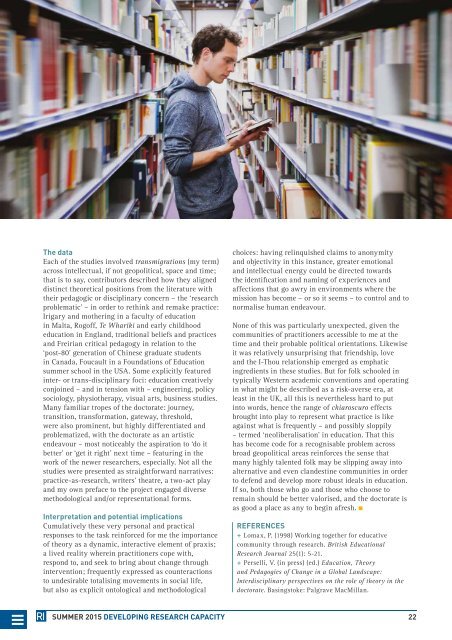CAPACITY
04347-BRA-RI-Magazine-Edition127-Interactive-01-1
04347-BRA-RI-Magazine-Edition127-Interactive-01-1
You also want an ePaper? Increase the reach of your titles
YUMPU automatically turns print PDFs into web optimized ePapers that Google loves.
The data<br />
Each of the studies involved transmigrations (my term)<br />
across intellectual, if not geopolitical, space and time;<br />
that is to say, contributors described how they aligned<br />
distinct theoretical positions from the literature with<br />
their pedagogic or disciplinary concern – the ‘research<br />
problematic’ – in order to rethink and remake practice:<br />
Irigary and mothering in a faculty of education<br />
in Malta, Rogoff, Te Whariki and early childhood<br />
education in England, traditional beliefs and practices<br />
and Freirian critical pedagogy in relation to the<br />
‘post-80’ generation of Chinese graduate students<br />
in Canada, Foucault in a Foundations of Education<br />
summer school in the USA. Some explicitly featured<br />
inter- or trans-disciplinary foci: education creatively<br />
conjoined – and in tension with – engineering, policy<br />
sociology, physiotherapy, visual arts, business studies.<br />
Many familiar tropes of the doctorate: journey,<br />
transition, transformation, gateway, threshold,<br />
were also prominent, but highly differentiated and<br />
problematized, with the doctorate as an artistic<br />
endeavour – most noticeably the aspiration to ‘do it<br />
better’ or ‘get it right’ next time – featuring in the<br />
work of the newer researchers, especially. Not all the<br />
studies were presented as straightforward narratives:<br />
practice-as-research, writers’ theatre, a two-act play<br />
and my own preface to the project engaged diverse<br />
methodological and/or representational forms.<br />
Interpretation and potential implications<br />
Cumulatively these very personal and practical<br />
responses to the task reinforced for me the importance<br />
of theory as a dynamic, interactive element of praxis;<br />
a lived reality wherein practitioners cope with,<br />
respond to, and seek to bring about change through<br />
intervention; frequently expressed as counteractions<br />
to undesirable totalising movements in social life,<br />
but also as explicit ontological and methodological<br />
choices: having relinquished claims to anonymity<br />
and objectivity in this instance, greater emotional<br />
and intellectual energy could be directed towards<br />
the identification and naming of experiences and<br />
affections that go awry in environments where the<br />
mission has become – or so it seems – to control and to<br />
normalise human endeavour.<br />
None of this was particularly unexpected, given the<br />
communities of practitioners accessible to me at the<br />
time and their probable political orientations. Likewise<br />
it was relatively unsurprising that friendship, love<br />
and the I-Thou relationship emerged as emphatic<br />
ingredients in these studies. But for folk schooled in<br />
typically Western academic conventions and operating<br />
in what might be described as a risk-averse era, at<br />
least in the UK, all this is nevertheless hard to put<br />
into words, hence the range of chiaroscuro effects<br />
brought into play to represent what practice is like<br />
against what is frequently – and possibly sloppily<br />
– termed ‘neoliberalisation’ in education. That this<br />
has become code for a recognisable problem across<br />
broad geopolitical areas reinforces the sense that<br />
many highly talented folk may be slipping away into<br />
alternative and even clandestine communities in order<br />
to defend and develop more robust ideals in education.<br />
If so, both those who go and those who choose to<br />
remain should be better valorised, and the doctorate is<br />
as good a place as any to begin afresh. n<br />
REFERENCES<br />
+ Lomax, P. (1998) Working together for educative<br />
community through research. British Educational<br />
Research Journal 25(1): 5-21.<br />
+ Perselli, V. (in press) (ed.) Education, Theory<br />
and Pedagogies of Change in a Global Landscape:<br />
Interdisciplinary perspectives on the role of theory in the<br />
doctorate. Basingstoke: Palgrave MacMillan.<br />
SUMMER 2015 DEVELOPING RESEARCH <strong>CAPACITY</strong> 22


